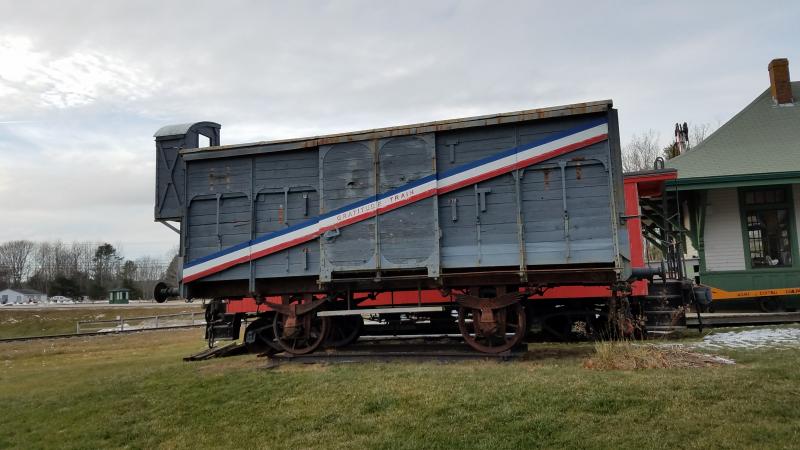Boothbay Railway Village hosted a lecture from Jeff Caldon on the historic Merci Car Feb. 3. The Merci Car was one of 49 train cars gifted in 1949 to each state plus the then-territories of Hawaii and Washington, D.C.
The Merci Car, as the name suggests, was a thank you to Americans for the “Friendship Car,” a massive donation of food and necessities to France and Italy at the end of World War II.
The idea for the Friendship Train was sparked by famed journalist Drew Pearson in his controversial “The Merry-Go-Round” column in the Washington Post, said Caldon. As newspapers caught onto the idea and spread it from coast to coast, 80 cars left Los Angeles, California in November 1947. The train stopped various times collecting goods, and grew to 700 cars before reaching New York City where the cars and their $40 million in cargo were shipped before the end of the year.
In return, the Merci Cars were sent. One car for each state, cargo included mostly souvenirs, family heirlooms and various items of value to French families as tokens of gratitude.
The car involved the main method of mass military transportation during both World Wars. At 20.5 feet by 8.5 feet, the cars were branded “40 and 8's” during World War I, as signified by signs on the cars which read “Hommes 40; Cheveaux 8” – French for “40 men; 8 horses.”
Caldon’s interest in the subject was piqued when a family friend showed the last letter she received from her father who traveled to the front lines during World War II.
“… That's how we ride: 40 men in a car plus our packs and rifles and to say the least, it is very crowded in the daytime, but in the nights it is worse trying to sleep … Just as soon as the train stops, the fellows climb out and try and see what they can see …,” Caldon read from the letter. It also told of young men catching moments of rest and relaxation playing with farmers’ dogs, attempting to milk cows and starting fires to warm food and cook coffee.
Since first reading the letter, Caldon has collected several World War II veterans’ accounts of traveling via 40 and 8’s. One veteran he interviewed recounted shipment via rail being more like a two-day fistfight as 40 young men struggled to get comfortable before meeting certain death on the French front lines.
Caldon said he could not stress enough the importance of preserving the pieces of history as only a handful of Merci Cars still exist. Boothbay Railway Village completed its restoration of Maine’s Merci Car in 2009 and moved it to a spot between Thorndike Station and the antique auto exhibit after replacing the original 13 plaques representing France’s then 13 provinces. The artifacts from the shipment are held at the Maine State Museum in Augusta.
“Why is an old French boxcar important,” asked Caldon. “… To remember what they went through, good or bad, and it's the mission of a museum to construct memory – this car has that dual purpose … One is the military history … And they said 'thank you' for something – the Friendship Train that brought them life. These people gave up items from their houses, heirlooms when they had nothing left … That's what that train represents.”




























